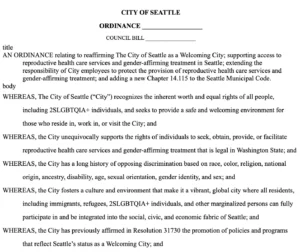Seattle has reaffirmed its commitment to inclusivity and civil rights with the City Council’s unanimous passage of the ‘Welcoming City’ ordinance on Tuesday. The legislation aims to bolster protections for 2SLGBTQIA+ individuals—including those seeking reproductive health services and gender-affirming care—while reinforcing Seattle’s stance as a safe haven against restrictive federal policies.
Council President Sara Nelson, who sponsored the ordinance, emphasized its significance in safeguarding vulnerable communities.
“This legislation sends a clear message: Seattle is and will remain a safe harbor for communities under relentless attacks from the Trump Administration and its allies,” Nelson stated. “Seattle has long been a welcoming city, offering services and support to anyone in need. This proposal will defend vulnerable people from anti-choice and anti-transgender policies that do not reflect our values or needs as a community.”

The new law extends Washington State’s ‘Shield Law’ into city policy, ensuring that individuals seeking or providing reproductive or gender-affirming care in Seattle are protected from out-of-state legal actions. According to the Washington State Attorney General’s office, the Shield Law prevents state courts from enforcing subpoenas related to protected health care services that are lawful within Washington.
The ordinance is part of a broader legislative push in Seattle following the overturning of Roe v. Wade, which has included measures to safeguard reproductive rights and criminalize interference with individuals accessing reproductive or gender-affirming care.
The council’s decision comes at a politically charged moment, as city officials navigate civil rights advocacy while avoiding potential backlash from conservative factions. Meanwhile, a separate resolution—proposed by Councilmember Rob Saka and Mayor Bruce Harrell—is still under consideration. That measure seeks to officially acknowledge the shortcomings of the ‘defund the police’ movement while reaffirming the city’s commitment to public safety and underserved communities.






